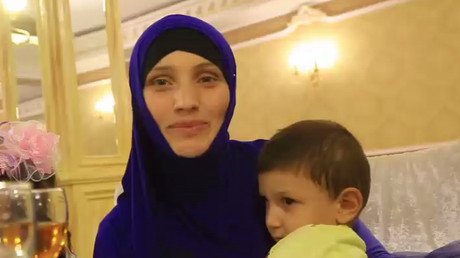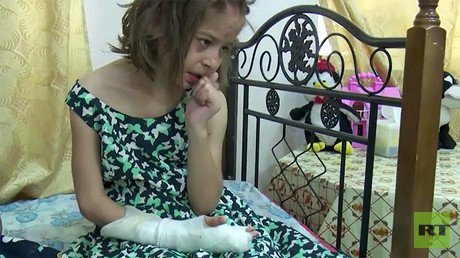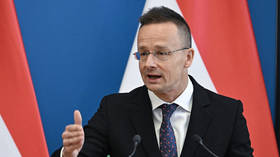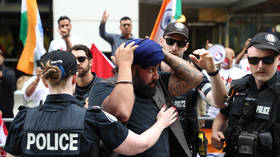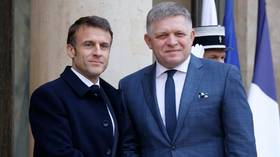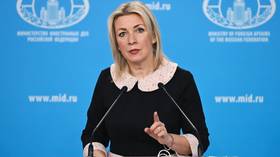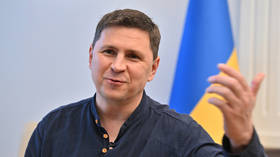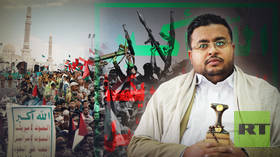90% of Iraqi children have lost a relative, orphans exposed to rape & abuse – charities to RT
The battle against ISIS in Iraq has devastated civilian lives, particularly those of children. While some have been reunited with surviving relatives, hundreds of them remain abandoned or in dire need of psychological help in Iraqi orphanages.
Over the past months, together with Iraqi and Russian authorities, RT has been leading a “Bring them home” campaign, focused on returning Russian speaking orphans back home. Some of the children, recognized by their relatives after being shown on RT, have already been sent to their families.
“We already managed to return six children [to Russia],” Iraq's ambassador to Russia, Haidar Mansour Hadi, told RT.
The ambassador explained that once children, whose parents are believed to have been killed while fighting in IS ranks are discovered, they are put in government run children’s homes in Baghdad, where “they are provided with the best services, looked after and given food, clothing and good caring until we find their relatives and they prove the kinship.”
There are several such children’s homes in the Iraqi capital, but the plan is to put all of those children in one home, so it is easier to coordinate the efforts of various government entities involved in the process and speed it up. Iraq is also in the process of setting up a database “to know exactly how many children, how many people the Iraqi government and the Iraqi embassy can help through diplomatic and legal channels, to return those children safely home.”
Just this week, two more children, whose parents are believed to be Russian-speaking, were brought into the orphanage in Baghdad. However, getting the new arrivals to open up and talk has proved to be a difficult process.
READ MORE: Iraq will be free from ISIS terrorists ‘within days’ – Iraqi ambassador to RT
Mouhamed allegedly speaks a mixture of Russian and Arabic, but says nothing to reveal his identity. He has an injury on one of his knees.
Haddja says nothing at all. She is suffering from a wound to her ankle, in what appears to be a severe burn.
One of their mates said both children were brought into the orphanage at night, and she has not heard either of them speak Russian since. The team working on the ground is now trying to establish if the children are of Russian descent.
'We are waiting you home': Relatives of Russian children in Iraq come forward after RT coverage https://t.co/9shHoqUBaSpic.twitter.com/7Ygoie1EZ5
— RT (@RT_com) August 13, 2017
Many Iraqi children have endured more bloodshed and agony than most adults will in a lifetime. Children living in violent environments experience horrors which most others are not subjected to, such as destruction of their homes, the death of parents, siblings and friends. Those who end up by themselves are forced to make critical survival decisions at a young age to live through situations where they believe they will die.
“Nearly 90 percent of children have lost a member of their family – either they were kidnapped or killed. When they were escaping – they were shot at from behind, or fell on booby traps,” Aram Shakaram, from Save The Children, told RT.
Once found by authorities and brought to relative safety, the children require both psychological and physical help, support which orphanages in Iraq are struggling to provide.
“We are helping those children, certainly we don’t have enough resources. Children are almost everywhere,” Shakaram noted. “But ultimately, the support comes from family, from government and from extended family. Once we connect the children, everyone is keen to receive them and support them.”
The problem, as RT's Murad Gazdiev has found out in Erbil, Iraq, is making that connection with the lost relatives, especially since most of them suffer from psychological trauma and don’t talk much.
“As soon as a helicopter flies around, the children drop to the floor and cry. Some of them cry at night. Some fear when they see foreigners. Some fear when they see strangers. Some shut up and say no word for a long time, until they open up,” Maulid Warfa from the United Nations Children’s Fund told RT.
“It’s severe distress. And many of them are wounded – some of the hospitals we visit confirm that the biggest number of civilians they have in the hospitals are children,” Warfa added.
Previous studies of psychological problems in persons who have witnessed and experienced the horrors of war noted a wide range of conditions. Post traumatic stress disorder and various forms of anxiety disorders are most common, in addition to depression and prolonged grief disorder.
Helping children of foreign ISIS fighters find homes is no easier than helping Iraqi orphans reunite with loved ones.
#Russia is actively trying to bring several dozen children from Iraqi orphanages back home https://t.co/ZtRPopQ8A6
— RT (@RT_com) August 14, 2017
“It is much better if foreign children were reunited with their families. They will have problems here – with documents, in schools, with healthcare. They need their families love,” the director of Mosul's orphanage, Tahin Ami, told RT.
Even those children who live with relatives are prone to abuse and various dangers of the war-torn country, RT has found.
“They are vulnerable to abuse. They are vulnerable to trafficking, they are vulnerable to any danger that children are exposed to,” Warfa noted. “With today’s technology, a bad group could go get those children and harm them.”
To protect them, Warfa says, social care workers teach them not to talk to strangers. Charities also try avoiding to needlessly show children on camera in order to protect their identities.
Deadly Surprises: #ISIS leaves booby traps throughout #TalAfar as Iraqi army fights for city https://t.co/7JgtAjinIO
— RT (@RT_com) August 28, 2017
The Iraqi government is meanwhile trying to return children of foreign ISIS fighters back home, and is in the process of setting up a database to help the repatriation process, Ambassador Hadi told RT.
“There were terrorists from almost 100 countries, including from the US, Europe, and even as far as China, who we were fighting in Iraq,” Hadi said. “We believe there is probably more.”
So far, about 500 children of those terrorists have been discovered in areas previously controlled by IS, the diplomat noted.
The ambassador also expressed hope that more countries will join Russia’s initiative to help return home the innocent children of their radicalized parents, who chose to die in Iraq fighting alongside the terrorist group.
“We believe that once we clear up all the areas and find [such] children there, more countries will come forward and contact us asking for their children back.”
If you have any information about the children in our videos, you can contact us at children@rttv.ru.
